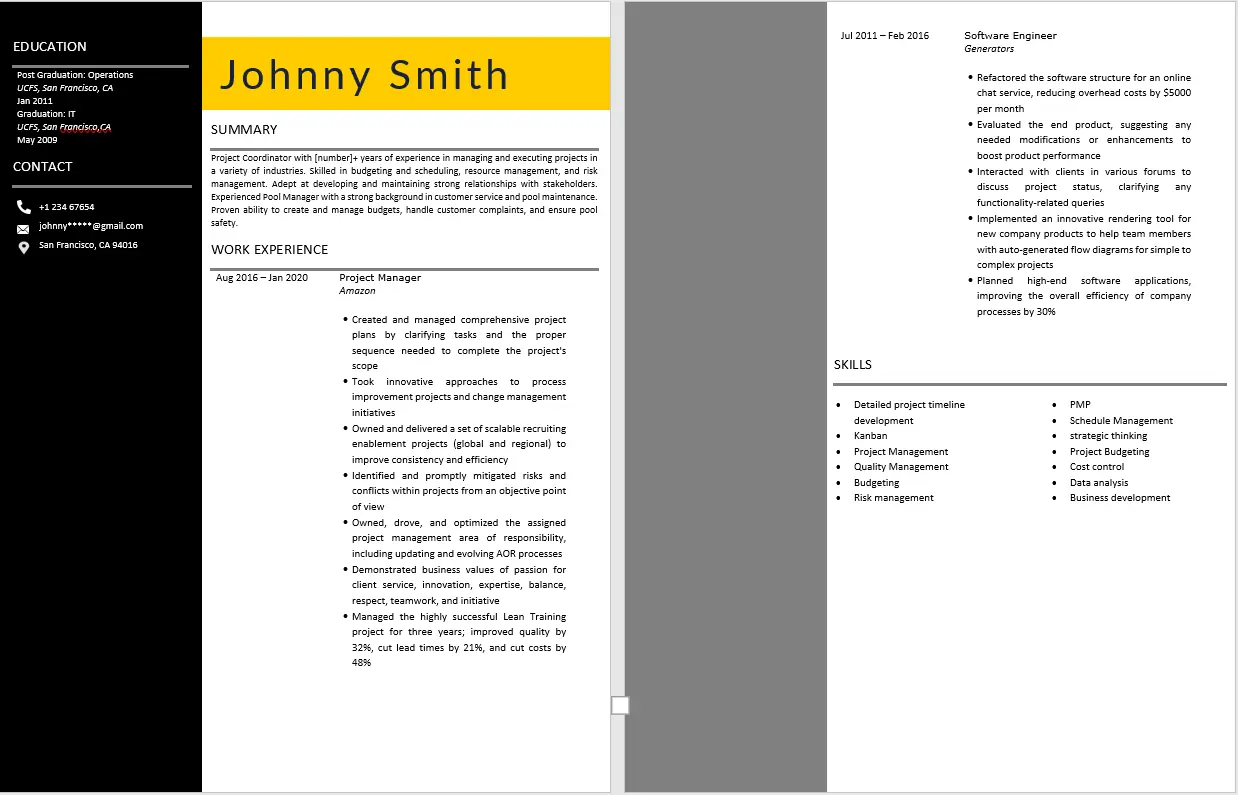 Written By Editorial Team
Written By Editorial Team
Can a resume be 2 pages? Is a 2 page resume acceptable? These are questions we have all been stumped with. The 1 page resume is considered the standard, but there are occasions where the two page resume might be the preferable choice. In fact, if used right, a 2 page resume can even improve your chances of landing a job.
2 Page Resume Or 1 Page Resume? Which Is Better?
Is a 2 page resume better than a 1 page resume? The correct one is, none!
There are instances where a 1 page resume may be better, but on occasions when a recruiter wants more information about you, a 2-page resume might be the right choice. The proper two page resume should have concrete factual information that adds more depth to your application and helps the recruiter in making a decision.
When To Use A 2 Page Resume?
A 2 page resume should be used cautiously; it is not meant for everyone. Here are the particular instances when a 2 page resume is considered appropriate.
Applying For A Highly Experienced Role
Some jobs demand extensive relevant experience. For these, a two-page resume is a gold standard. Now is the time to let your achievements shine!
Also Read :- Cover letter for internal position
Some careers we have noted demanding a 2-page resume include project managers, executives, business analysts, marketing managers, accountants, financial analysts, and office managers, among others.
Even positions such as government jobs may require you to add extensive details about yourself and your past jobs, making a 2 page resume the best choice.
Extensive Experience Must Be Highlighted
It particularly works well for job seekers with at least 10 years or more relevant experience. Sometimes, a single page may not be enough to fully encapsulate the responsibilities you undertook in your respective roles or the achievements you made. Such candidates who try to trim down their work history into one page may need to cut away important skills and abilities (you never know what will catch the recruiter’s eye!).
This also applies to professions in academia, healthcare, research, or technology, where you may need to add comprehensive details about your past projects, certifications, or research you undertook.
This, of course, does not mean that you should inflate your existing experience to extend it to two pages. Longer resumes are not mandatory and should only be used if you have enough “legitimate” material to make a worthy 2-page resume.
What Are The Benefits Of A 2 Page Resume?
A 2 page resume can prove to be beneficial for you in some aspects. For one, they allow you to showcase your extensive professional experience, instantly positioning yourself as a qualified candidate.
Moreover, it gives you enough space to list all the necessary qualifications and certifications you earned. Hiring managers will also find such resumes easier to skim through, where the information is neatly spread out.
Finally, you can use relevant keywords multiple times throughout your resume.
When To Not Use A 2 Page Resume?
Just as there are cases where a 2 page resume is considered the standard, there are also instances where a 2 page resume probably is not the best choice. Using a 2 page resume here may even affect your chances of landing your dream job.
Applying For an Entry-Level Role
If you are a relatively experienced candidate, it is highly implausible that you would be seeking an entry-level role in an organization. If you send in a 2-page resume, there is a large chance that the hiring manager may feel you have overinflated your achievements or you are not in high demand. Such resumes end up straight in the shredder.
The only exception to this rule is when applying for an internship; then, you may want to add plenty of academic achievements to back you up.
Read More :- How to write resume for fresher
Poor Experience
If you do not have enough relevant experience or are just stepping into your professional career, a 2 page resume is simply unnecessary.
As a rule of thumb, if you have less than 5 years of professional experience, keeping your resume to one page is best.
Tips For Creating The Perfect 2 Page Resume
Do not make the mistake of assuming that a 1 page resume is somehow the same as a 2 page resume. There are some additional details you may need to pay attention to if you hope for a stellar resume.
Always Add Important Information on Page 1
Remember, the hiring manager will most likely not go past page 1 of your resume if you do not have significant and relevant information there. Page 1 is your chance to make a strong impression.
For instance, page 1 should include your latest job position and any achievements and responsibilities you had in that role. This is probably what the hiring manager wants to see first; it makes more sense to have this penned down on the first page.
Don’t Repeat Information
Avoid repeating the information you mentioned on page 1 anywhere on page 2. The hiring manager may see this as an attempt to inflate your resume appearance. Moreover, hiring managers have limited time to go through your resume; if they spot repeated information, they may lose interest quickly.
Ensure You Add Your Name and Contact Info on Both Pages
If your resume expands to two pages, make sure you have your name and contact information listed on both pages. While the header of your first page should be larger, you still want to include your name and contact info somewhere at the top on page 2.
Only add key information on page two; you may not have to repeat your profile picture and stick to basic information such as your name, contact number, and email address.
Ensure Proper Formatting
When crafting a two page resume, you want to make sure the style and formatting are consistent on both pages. Keep a one-inch margin on either side of the pages, and use a simple, legible font such as Calibri, Arial, or the classic Times New Roman.
Number The Pages to Show the Order
Included in your header should be a numbering of the pages. This will help immediately notify the hiring manager that your resume is more than 1 page. Adding page numbers will also help the hiring manager distinguish the correct order of your resume.
Add Volunteer Work and Extracurriculars
We talked about adding important information to the first page of your resume. But what about the additional certifications, professional associations, and volunteer work you performed? These should all be listed on your second page.
Avoid Double-Sided Resumes
A final tip to creating a stellar resume is to always avoid making a double-sided resume. Your resume should be printed one-sided on two pages. This is because it is easy for the hiring manager to overlook the second side of your resume if it is on the back of the sheet. A second separate page is much harder to miss.
Avoid Making A 1.5 Page Resume
In some cases, you may end up with a 1.5 page resume. Unfortunately, this leaves too much empty space and can make your resume look unprofessional. There are two ways to go about this.
- One, you should narrow down your resume by excluding irrelevant information to make sure it fits into one page. You can also remove unnecessary design features, reduce the white space or even add additional columns to help fit the information better onto one page.
- Two, you should consider adding additional (but relevant) information, such as your certifications, qualifications, extracurriculars, or any volunteer work you performed to help fill in the empty space.
How To Present Your 2 Page Resume?
Now, how should you be handing in your resume? Remember to print the two page resume on two separate sheets and then use a paperclip to hold them together. Avoid using staples as they can make copying and scanning the document more difficult; a paperclip is much easier to remove and add as needed.
2 page resume example

Do Employers Prefer 1 Page Resumes or 2 Page Resumes?
This depends on the position you are applying for and the amount of experience you have. If you are applying for a role that demands extensive experience, the hiring manager may expect a two page resume.
On the other hand, if you are applying for an entry-level role and have less than 5 years of experience, a one page resume is what your hiring manager will prefer. Such resumes are easier to review and are more likely to only provide relevant information. If you do need a second page, using a resume format Word template will help maintain proper formatting across both pages.
Final Thoughts
Despite what you may have been told, a two page resume is completely acceptable so long as you have the necessary experience and qualifications to cover both pages. Your resume should be formatted professionally, following a consistent style throughout. Your work history should be concrete and should give the hiring manager enough insight to determine why you are a suitable candidate for the role. If done right, you will surely land the job of your dreams!
Read More :- Resume Margins

